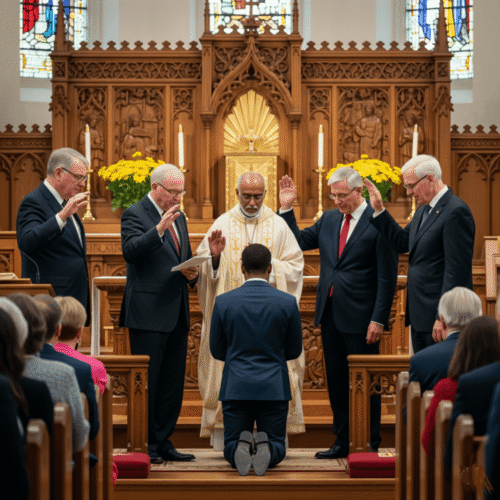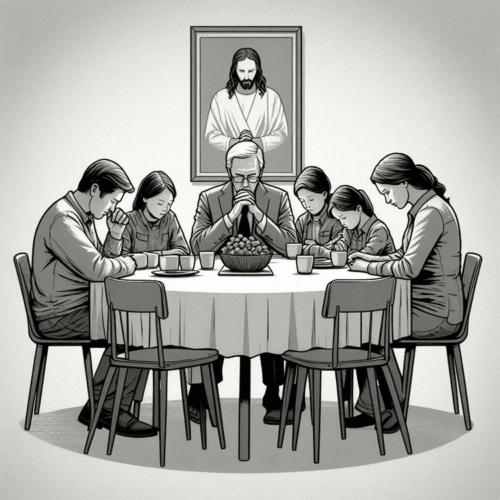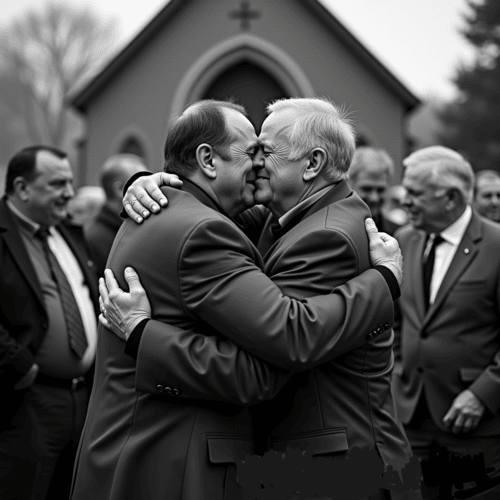Called to Ministry: Does God’s Call Override My Choice?
If you’ve felt God’s stirring on your heart toward ministry, you’ve likely wrestled with a profound question: If God has ordained my calling from eternity past, do my prayers, deliberations, and decisions actually matter?
This tension between divine sovereignty and human responsibility has challenged believers for centuries, but Reformed theology offers a compelling resolution that honours both biblical truth and lived experience.
DOES GOD’S CALL OVERRIDE MY CHOICE? THE HEART OF THE TENSION
The struggle feels real and urgent. Scripture clearly teaches God sovereignly calls people to ministry. Jeremiah heard God say, “Before I formed you in the womb I knew you, before you were born I set you apart; I appointed you as a prophet to the nations” (Jeremiah 1:5). Paul reminds us “we are God’s handiwork, created in Christ Jesus to do good works, which God prepared in advance for us to do” (Ephesians 2:10). These verses suggest our calling predates our birth, seemingly leaving no room for choice.
Yet Scripture also presents us with genuine human agency. Joshua challenged Israel to “choose for yourselves this day whom you will serve” (Joshua 24:15). Paul spoke of being “compelled” to preach yet serving “willingly” (1 Corinthians 9:16-17). We see biblical figures wrestling in prayer, seeking counsel, and making real decisions about their calling.
So which is it? Are we simply actors living out a predetermined script, or do our choices genuinely matter in God’s plan?
THE BIBLICAL FOUNDATION FOR BOTH REALITIES
Reformed theology insists we don’t have to choose between divine sovereignty and human responsibility—Scripture affirms both. Romans 8:29-30 reveals God’s eternal purpose in salvation: “For those God foreknew he also predestined to be conformed to the image of his Son… And those he predestined, he also called; those he called, he also justified; those he justified, he also glorified.” This “golden chain” shows God’s sovereign work from eternity to eternity.
Yet the same Paul who wrote these words also spoke of his ministry as involving genuine choice and effort. In Acts 13:2, we see the Holy Spirit specifically calling Paul and Barnabas, but this calling came through prayer, fasting, and the discernment of the church. The divine decree included the human means.
This reveals a crucial Reformed principle: God ordains both the ends and the means. He doesn’t merely decree certain people will enter ministry; He ordains the entire process by which they come to that calling—including their prayers, struggles, confirmations, and decisions.
THE WESTMINSTER FRAMEWORK: COMPATIBLE FREEDOM
The Westminster Confession of Faith (Chapter 3) teaches God’s eternal decree includes human actions without making them any less real or meaningful. Chapter 9 explains that while sin has affected our will, regenerated believers operate with genuine freedom—what theologians call “liberty of spontaneity.”
This means our choices flow from our nature and desires, not from external compulsion. When God calls someone to ministry, He doesn’t override their will; He transforms it. Through regeneration and sanctification, He aligns our desires with His purposes so we willingly choose what He has ordained.
Think of it this way: when we choose our favourite food, we’re not being coerced—we’re acting according to our nature and preferences. Similarly, when God calls us to ministry, He works through our renewed nature to create genuine desire and willing response.
WHY THIS ENHANCES RATHER THAN ELIMINATES CHOICE
Far from making our choices meaningless, divine ordination actually makes them more significant. Consider three key points:
- God’s ordination ensures our choices align with His perfect purposes. Without divine sovereignty, our decisions would be subject to countless variables beyond our control. But knowing that God works “all things according to the counsel of his will” (Ephesians 1:11) gives our choices eternal significance.
- The process of discernment itself is part of God’s ordained means. Our wrestling in prayer, seeking wise counsel, and carefully considering circumstances aren’t obstacles to God’s will—they’re the very means through which He reveals and confirms His calling. The journey of discernment sanctifies us and prepares us for the ministry He has prepared.
- Willing service is the only kind that matters to God. Forced obedience would be meaningless to a God who desires our hearts. By working through our renewed nature, God ensures our service flows from genuine love and desire, not mere compulsion.
LIVING IN THE TENSION
Understanding this doctrine has profound practical implications. When you pray about your calling, you’re not trying to discover information God hasn’t already decided—you’re participating in the ordained means by which God reveals His will to you. Your earnest seeking, Scripture study, and pursuit of confirmation from the church are all part of how God works out His eternal purposes.
This brings tremendous comfort in difficult seasons. When ministry feels overwhelming or unclear, you can rest in the knowledge that God’s sovereignty ensures His calling will be fulfilled. Your struggles and uncertainties don’t threaten His plan—they’re part of it.
Yet this doctrine also motivates diligent action. Knowing God works through means should drive us to pray more earnestly, seek counsel more carefully, and pursue preparation more thoroughly. We act with both confidence in God’s sovereignty and urgency about our responsibility.
DOES GOD’S CALL OVERRIDE MY CHOICE? ADDRESSING COMMON CONCERNS
Some worry this makes prayer pointless. Why pray about calling if God has already decided? But this misunderstands how God works. Prayer isn’t about changing God’s mind—it’s about aligning our hearts with His will and participating in the means He has ordained. The process of seeking God through prayer is itself part of His calling.
Others fear this reduces us to mere puppets. But there’s a crucial difference between mechanical determinism and personal agency. God doesn’t manipulate us like objects; He works through our nature, desires, and reasoning. Our choices are genuine expressions of who we are, even as they fulfil His eternal purposes.
What about those who seem to resist God’s call? This remains a mystery within God’s sovereignty. Scripture teaches God permits rebellion while ultimately accomplishing His purposes. Even human resistance serves His greater plan, though this doesn’t diminish our responsibility to respond faithfully.
DOES GOD’S CALL OVERRIDE MY CHOICE? THE FREEDOM OF WILLING SERVICE
The Reformed understanding of calling offers profound freedom. We don’t have to carry the burden of making the “right” choice in our own strength. Instead, we can trust that as we seek God faithfully, He will guide our steps according to His perfect will.
This means we can approach ministry calling with both confidence and humility. Confidence, because we know God’s sovereignty ensures His purposes will be fulfilled. Humility, because we recognise our willing response is itself a gift of His grace.
The greatest freedom isn’t the ability to choose randomly among infinite options—it’s the liberty to choose what aligns with God’s perfect will and your renewed nature. When God calls us to ministry, He’s not constraining our freedom; He’s directing it toward our highest joy and His greatest glory.
Our calling is both divinely ordained and personally chosen. In God’s perfect wisdom, these aren’t contradictory truths—they’re complementary realities that should fill us with wonder, confidence, and eager anticipation of how He will work through our willing service.
DOES GOD’S CALL OVERRIDE MY CHOICE? RELATED FAQs
How did John Calvin understand his calling to ministry in Geneva? Calvin famously described his calling as being “dragged” into ministry against his natural inclinations. He wrote that God “thrust me into the game” when he wanted to pursue quiet scholarship. Yet Calvin also spoke of his willing embrace of this calling once he understood it as God’s will. This perfectly illustrates the Reformed principle: God’s irresistible calling works through our nature, not against it, transforming our reluctance into willing obedience.
- What about those who feel called to ministry but are rejected by their denomination or church? Reformed theology distinguishes between internal calling (the personal sense of God’s call) and external calling (recognition and ordination by the church). Both are necessary for legitimate ministry. If the church consistently rejects someone’s sense of calling, Reformed theologians like John Owen would suggest either the timing isn’t right, the person has misunderstood their calling, or God is redirecting them to a different form of ministry. The church’s role in confirming calling is itself part of God’s ordained means.
- How does this apply to women who feel called to ministry in complementarian churches? This represents one of the most challenging applications of Reformed calling theology. Complementarian scholars like John Piper argue God’s calling must align with His revealed will in Scripture regarding church offices. They suggest women sensing a call to preaching ministry might be experiencing God’s direction toward teaching roles that fit within biblical parameters. The tension remains pastoral and complex, requiring careful discernment of both Scripture and spiritual gifts.
Didn’t Charles Spurgeon struggle with assurance about his calling? Spurgeon experienced significant doubt about his calling, especially during his early ministry at New Park Street Chapel. He later wrote these struggles were part of God’s preparation, deepening his dependence on divine grace rather than personal confidence. Spurgeon found assurance not in the absence of doubt, but in God’s faithfulness despite his weaknesses. His experience shows questioning one’s calling can coexist with genuine divine ordination.
- What about bi-vocational ministry—does this represent a “lesser” calling? Reformed theology strongly affirms God’s calling includes the manner and context of ministry, not just ministry itself. The Apostle Paul worked as a tentmaker while pioneering churches, and the Reformers included many who maintained other vocations. Martyn Lloyd-Jones practiced medicine before full-time preaching, viewing both as divine callings for different seasons. God’s ordination encompasses whether someone serves in full-time, part-time, or bi-vocational ministry.
- How should folks respond if they feel their calling has changed or ended? Richard Baxter wrote extensively about the seasons of ministry calling. He understood God’s eternal decree includes not just the fact of calling but its duration and evolution. Someone sensing a change in calling should seek the same confirmation they sought initially: prayer, Scripture study, wise counsel, and church discernment. The same God who called them into ministry can redirect them to new forms of service or even into “secular” vocations that serve His kingdom purposes.
What about people who enter ministry and later realise they were never truly called? This painful situation requires distinguishing between temporary doubt (which most ministers experience) and genuine recognition of misdirection. Reformed pastor John Chrysostom’s principle applies: if someone can pursue other work without compromising their conscience before God, they may not have been called to ministry. However, this decision should never be made in isolation or during crisis periods. The same church community that confirmed the original calling should help discern whether this represents a genuine redirection or a temporary struggle requiring perseverance.
DOES GOD’S CALL OVERRIDE MY CHOICE? OUR RELATED POSTS
Editor's Pick

The Nashville Statement: Why Affirm It Despite Media Backlash?
WHY DO REFORMED CHRISTIANS STAND BY THIS STATEMENT ON MARRIAGE AND GENDER? When the Nashville Statement was released in 2017, [...]

Who Is Belial? Solving The 2 Corinthians 6:15 Mystery
Belial: This name from the pages of Scripture chills the soul. Who is this mysterious figure Paul invokes in 2 [...]

Celibacy Or Castration: What Jesus Really Means in Matthew 19:12
One of Scripture's most shocking misinterpretations led theologian Origen to castrate himself in the third century. His tragic mistake? Taking [...]

Philippians 4:13: Did Paul Really Mean We Can Do ALL Things?
"I can do all things through Christ who strengthens me." It's on gym walls, graduation cards, and motivational posters everywhere. [...]

The Ordinary Means of Grace: Why Are They Indispensable?
ORDINARY MEANS FOR EXTRAORDINARY TRANSFORMATION What if God's most powerful work in believers' lives happens through the most ordinary activities? [...]

Is the Bible God’s Word? Or Does It Only Contain God’s Word?
The authority of Scripture stands at the crossroads of modern Christianity. While some argue the Bible merely contains God’s Word [...]

Will We Remember This Life in Heaven? What Isaiah 65:17 Means
"Will I remember my spouse in heaven? My children? Will the joy we shared on earth matter in eternity?" These [...]

From Empty to Overflow: The Abundant Life Jesus Promised
(AND WHY YOU SHOULDN’T SETTLE FOR LESS) We're surviving, but are we thriving? If we're honest, there's a gap between [...]

What Does Jesus Save Us From?
THREE BIBLE TRUTHS ABOUT SALVATION "Jesus saves." We’ve seen it on bumper stickers, heard it shouted at sporting events, maybe [...]

If God Wants Everyone Saved, Why Aren’t They?
THE REFORMED VIEW ON GOD’S DESIRE VS HIS DECREE The question haunts every believer who has lost an unbelieving loved [...]
SUPPORT US:
Feel the Holy Spirit's gentle nudge to partner with us?
Donate Online:
Account Name: TRUTHS TO DIE FOR FOUNDATION
Account Number: 10243565459
Bank IFSC: IDFB0043391
Bank Name: IDFC FIRST BANK






